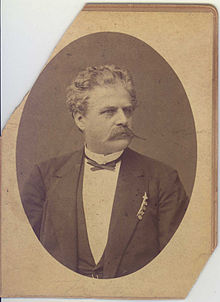Albert Parlow
Albert Parlow (born January 1, 1824 in Torgelow , Western Pomerania ; † June 27, 1888 in Wiesbaden ) was a German composer and music director of the Prussian Army until 1880 .
Life
As a military musician, Parlow composed a few naval marches . The popular anvil polka came about by chance.
The Berlin composer was commissioned in 1852 as the first German naval music master to set up the first German naval music corps in Stettin . His march composition with full sails is the first German naval march to be put on record. In May 1864 Parlow received first prize in the military band competition in Lyon, ahead of competitors from Great Britain, France, Italy, Austria, Russia and Spain. As an honorary prize winner of European military music, he was from Emperor Napoleon III. highly decorated.
Parlow was since 1854 military bandmaster of the grenadier regiment "King Friedrich Wilhelm IV." (1st Pomeranian) No. 2 in Stettin . After the regiment was relocated to Rastatt in 1859 , it performed frequently in Baden-Baden . Parlow aroused the interest of Johannes Brahms , who gave him the instrumentation of his Hungarian Dances Nos. 5, 6 and 11-16. Parlow transposed the 6th dance a semitone higher, from D flat major to D major.
Parlow was music director of the Prussian Army until 1880 . Then he went to Koenigsberg , where he took over the leadership of the music corps of Infantry Regiment No. 43 . In 1883 Albert Krantz (musician) was his successor.
In Hamburg Parlow led a symphony orchestra in 1883 . Most recently he was orchestra conductor in Wiesbaden from 1886. His son-in-law Arthur Michaelis was the director of the conservatory there.
Parlow was the grandfather of Melanie Michaelis and the father of Ernst Parlow, the brother-in-law of Gustav Havemann .
Anvil polka
The anvil as a solo instrument is certainly extraordinary. Nevertheless, Albert Parlow puts him in the spotlight and achieved world fame with his anvil polka. The anvil was used in Richard Wagner's Rheingold as early as 1853 . Inspired by this, the Berliner wrote a polka for “Solo-Anvil”.
- The first bars of the anvil polka:

Individual evidence
- ↑ a b c Parlow, Albert in Lexicon for Military Music in Württemberg ( Memento from January 1, 2011 in the Internet Archive ) In: Hanns-Helmut Schnebel: Lexicon on military music in Württemberg.
- ↑ On the back of the photograph, the birthday is January 1, 1822 , and the date of death July 26, 1888
- ^ Source on the relationship with Gustav Havemann
Web links
- Works by and about Albert Parlow in the catalog of the German National Library
- Short biography
| personal data | |
|---|---|
| SURNAME | Parlow, Albert |
| BRIEF DESCRIPTION | German composer |
| DATE OF BIRTH | January 1, 1824 |
| PLACE OF BIRTH | Torgelow |
| DATE OF DEATH | June 27, 1888 |
| Place of death | Wiesbaden |
